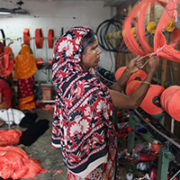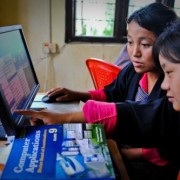Archive | Gender RSS feed for this section
Gender, Industry and trade
 Gender, Health
Gender, Health
 Gender
Gender
 Gender
Gender

Is female entrepreneurship a coping strategy during crises?

The recent global economic crisis, with its peak in 2008, resulted in a decline in global gross domestic product. It led to unstable financial markets and a lag in private sector demand (World Bank 2010). Its consequences, especially for the labor market, have been most unfortunate. In many countries, workers lost their jobs, wage earnings declined, and work hours shortened (World Bank 2011).
Economic impacts of obesity in the Republic of Korea

Obesity is a state of excessive body fat accumulation and is difficult to measure. Body mass index (BMI)—defined as weight in kilograms divided by the square of height in meters—has been used traditionally for its simplicity and the availability of data. Although shortcomings of using BMI have been acknowledged, its correlation with body fat percentage and its sensitivity in diagnosing obesity based on the body fat percentage have been verified for Korean people (Chung et al. 2016).
Inclusive development: can trade be good for women?

The United Nations Sustainable Development Goals (SDGs) highlight the need to achieve gender equality and to empower women and girls. Development that is truly inclusive clearly requires special attention to outcomes affecting more than half of the world’s population—yet historically, a group that has seen discrimination in law and fact over a long period.
Women helping women: key to economic growth in Asia

In the next 50 years, most economic growth worldwide will take place outside the G7 countries. But that’s only half the story. Who are the people who will be the driving force for this growth? Many will be women. But too seldom conversations about economic growth turn a blind eye to gender issues, despite the fact that women comprise more than half of the global economy, 40% of the global workforce (Commonwealth Workforce Council), and $20+ trillion in financial spending worldwide (International Finance Corporation 2011). Women have a multiplier effect as consumers, building markets as they make the majority of purchase decisions in households. The question is not whether women will contribute to the future global economy but by how much – and where.


Search
Subscribe / Connect to Asia Pathways
Subjects
- Agriculture and natural resources
- Blog
- Capacity development
- Climate change
- Economics
- Education
- Energy
- Environment
- Finance sector development
- Gender
- Governance and public sector management
- Health
- Industry and trade
- Information and Communications Technology
- Infrastructure
- Miscellaneous
- Population
- Poverty
- Private sector development
- Regional cooperation and integration
- Sanitation
- Social development and protection
- Transport
- Uncategorized
- Urban development
- Video Blog
- Water
Recent Posts
- Navigating Linear Transport Infrastructure Through Conservation Landscapes
- How Are Technology Trends Shaping the Future of Insurance?
- Securing Asia’s Future Through Soil Health: Why It Matters and What Must Be Done
- Silent Struggles: Advancing Women’s Mobility with Public Transportation in Asia
- Mind Your Neighbors: Measuring Shrimp Farm Spillovers




Recent Comments